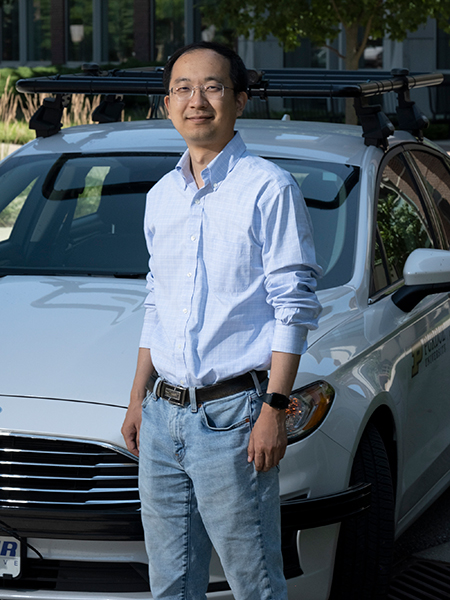CE's Feng leads testing of new autonomous car

The School of Civil Engineering has taken delivery of a new SAE Level 4 autonomous vehicle that will serve as a research platform.

Yiheng Feng, assistant professor of civil engineering, will lead testing of the car, including developing and testing smart transportation applications such as autonomous driving, cooperative perception, smart intersection management and cybersecurity.
This vehicle platform can be used to develop research prototypes and bridge gaps between theoretical models and real-world implementation. It also can be used as an education platform for undergraduate and graduate students to learn emerging technologies in smart transportation areas. It could also be an asset for the College’s Autonomous and Connected Systems (ACS) initiative, which has great potentials in enhancing multidisciplinary faculty collaboration and attracting external funding,” Feng said.
The car, a Ford Fusion hybrid, was enhanced by DATASPEED inc. The company installed the by-wire control system “so that the vehicle can be controlled by computer programs instead of human drivers,” Feng said, as well as a power distribution system and all of the sensors. The process took three months.

Feng worked with different units in his department, the College, and the university — risk management, parking, transportation, and Procurement Service to obtain the vehicle.
The vehicle is equipped with various onboard sensors, including one 64-layer LiDAR (light detection and ranging) device, one RGB front-view camera, one long-range radar for perception, one IMU and high-resolution GNSS system with RTK for localization, and a Cohda MK5 OBU for V2X communication. An onboard industrial PC (IPC) controls the vehicle using the Drive-By-Wire system provided by DATASPEED. The IPC’s computational power is provided by the Nvidia GPU card and Intel Xeon E processor, which is sufficient for real-time sensor data processing, path planning, and control of the vehicle.
Currently, Feng’s graduate students and postdoctoral researcher, Hanlin (Julia) Chen, are working with the vehicle. "Later, I plan to introduce new topics related to the autonomous vehicle in my courses such as CE361 and CE565 so that other graduate and undergraduate students will have chances to work with the vehicle and get firsthand experience."
